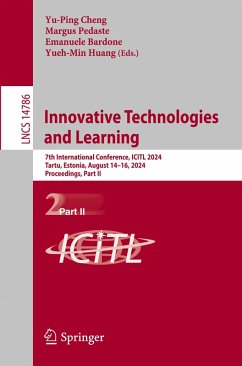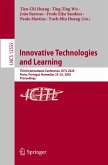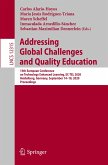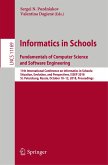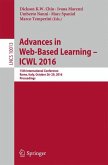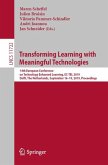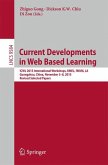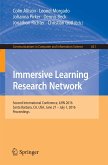Innovative Technologies and Learning
7th International Conference, ICITL 2024, Tartu, Estonia, August 14-16, 2024, Proceedings, Part II
Herausgegeben:Cheng, Yu-Ping; Pedaste, Margus; Bardone, Emanuele; Huang, Yueh-Min
Innovative Technologies and Learning
7th International Conference, ICITL 2024, Tartu, Estonia, August 14-16, 2024, Proceedings, Part II
Herausgegeben:Cheng, Yu-Ping; Pedaste, Margus; Bardone, Emanuele; Huang, Yueh-Min
- Broschiertes Buch
- Merkliste
- Auf die Merkliste
- Bewerten Bewerten
- Teilen
- Produkt teilen
- Produkterinnerung
- Produkterinnerung
The two-volume set LNCS 14785 and 14786 constitutes the refereed conference proceedings of the 7th International Conference on Innovative Technologies and Learning, ICITL 2024, Tartu, Estonia, during August 14 -16, 2024.
The 60 full papers included in this book were carefully reviewed and selected from 131 submissions. They were organized in topical sections as follows:
Part One : Artificial Intelligence in Education; Computational Thinking in Education; Design and Framework of Learning Systems and Pedagogies to Innovative Technologies and Learning.
Part Two : STEM/STEAM Education;…mehr
Andere Kunden interessierten sich auch für
![Innovative Technologies and Learning Innovative Technologies and Learning]() Innovative Technologies and Learning77,99 €
Innovative Technologies and Learning77,99 €![Addressing Global Challenges and Quality Education Addressing Global Challenges and Quality Education]() Addressing Global Challenges and Quality Education62,99 €
Addressing Global Challenges and Quality Education62,99 €![Informatics in Schools. Fundamentals of Computer Science and Software Engineering Informatics in Schools. Fundamentals of Computer Science and Software Engineering]() Informatics in Schools. Fundamentals of Computer Science and Software Engineering39,99 €
Informatics in Schools. Fundamentals of Computer Science and Software Engineering39,99 €![Advances in Web-Based Learning - ICWL 2016 Advances in Web-Based Learning - ICWL 2016]() Advances in Web-Based Learning - ICWL 201639,99 €
Advances in Web-Based Learning - ICWL 201639,99 €![Transforming Learning with Meaningful Technologies Transforming Learning with Meaningful Technologies]() Transforming Learning with Meaningful Technologies77,99 €
Transforming Learning with Meaningful Technologies77,99 €![Current Developments in Web Based Learning Current Developments in Web Based Learning]() Current Developments in Web Based Learning39,99 €
Current Developments in Web Based Learning39,99 €![Immersive Learning Research Network Immersive Learning Research Network]() Immersive Learning Research Network39,99 €
Immersive Learning Research Network39,99 €-
-
-
The two-volume set LNCS 14785 and 14786 constitutes the refereed conference proceedings of the 7th International Conference on Innovative Technologies and Learning, ICITL 2024, Tartu, Estonia, during August 14 -16, 2024.
The 60 full papers included in this book were carefully reviewed and selected from 131 submissions. They were organized in topical sections as follows:
Part One : Artificial Intelligence in Education; Computational Thinking in Education; Design and Framework of Learning Systems and Pedagogies to Innovative Technologies and Learning.
Part Two : STEM/STEAM Education; VR/AR/MR/XR in Education; and Application and Design of Generative Artificial Intelligence in Education.
The 60 full papers included in this book were carefully reviewed and selected from 131 submissions. They were organized in topical sections as follows:
Part One : Artificial Intelligence in Education; Computational Thinking in Education; Design and Framework of Learning Systems and Pedagogies to Innovative Technologies and Learning.
Part Two : STEM/STEAM Education; VR/AR/MR/XR in Education; and Application and Design of Generative Artificial Intelligence in Education.
Produktdetails
- Produktdetails
- Lecture Notes in Computer Science 14786
- Verlag: Springer / Springer Nature Switzerland / Springer, Berlin
- Artikelnr. des Verlages: 978-3-031-65883-9
- 2024
- Seitenzahl: 280
- Erscheinungstermin: 21. Juli 2024
- Englisch
- Abmessung: 235mm x 155mm x 16mm
- Gewicht: 429g
- ISBN-13: 9783031658839
- ISBN-10: 3031658833
- Artikelnr.: 70940484
- Herstellerkennzeichnung Die Herstellerinformationen sind derzeit nicht verfügbar.
- Lecture Notes in Computer Science 14786
- Verlag: Springer / Springer Nature Switzerland / Springer, Berlin
- Artikelnr. des Verlages: 978-3-031-65883-9
- 2024
- Seitenzahl: 280
- Erscheinungstermin: 21. Juli 2024
- Englisch
- Abmessung: 235mm x 155mm x 16mm
- Gewicht: 429g
- ISBN-13: 9783031658839
- ISBN-10: 3031658833
- Artikelnr.: 70940484
- Herstellerkennzeichnung Die Herstellerinformationen sind derzeit nicht verfügbar.
.- STEM/STEAM Education.
.- The Relationship between Research Productivity and Teaching Effectiveness.
.- Teaching Postgraduate Students User Experience Evaluation Through Eye Tracking Technology: An Experiential Learning Approach.
.- Exploring the Impact of Digital Building Blocks on Spatial Self-Efficacy in Adults of Different Genders.
.- A study on elementary school students in the middle grades using mBot robot cars explore local communities in an interdisciplinary curriculum.
.- Play My Math: Second development cycle of an EdTech tool supporting the teaching and learning of fractions through music in algebraic notation.
.- Virtual Game on Everyday Statistics.
.- VR/AR/MR/XR in Education.
.- Immersive Learning Environments: Fostering Self-Directed Learning in Junior High School Students through Virtual Tours.
.- Designing an AR e-book to support STEAM education.
.- Applying the POEC Teaching Strategy to Virtual Reality Teaching Activities: A Case Study.
.- The Empirical Research on the Impact of Applying VR Technology to Students' Skill Learning in Machining Processing Courses on Questionnaire Evaluation.
.- Creating a virtual and physical learning environment for business management students - integrating AR and STEM teaching strategies.
.- Effects of an Augmented Reality University Drug Prevention Board Game on University Students' Gaming Anxiety and Flow Experience.
.- Exploring Virtual Collaboration Platforms for Product Design Courses: A Preliminary Evaluation Study.
.- The impact of feedback mechanism in VR learning environment.
.- Application and Design of Generative Artificial Intelligence in Education.
.- Students' Perceptions of Study Efficacy, Effectiveness, and Efficiency: Effects of Voice assistant Use.
.- Bridging Literature and Code: Empowering Students to Explore Digital Humanities through Generative AI.
.- Enhancing Python Learning through Retrieval-Augmented Generation: A Theoretical and Applied Innovation in Generative AI Education.
.- Use of taxonomy in planning teaching activities in higher education.
.- The Impact of Integrating AI Chatbots and Microlearning into Flipped Classrooms: Enhancing Students' Motivation and Higher-Order Thinking Skills.
.- GAI-assisted personal discussion process analysis.
.- Enhancing Engagement and Motivation in English Writing through AI: The Impact of ChatGPT-Supported Collaborative Learning.
.- Designing Social Robots for Learning: HRI Participatory Design Workshop.
.- Investigating the driving factors of the use of generative AI among college students.
.- AI in Teacher Education: Introductory Training for PreService Teachers involving Microsoft Copilot.
.- Bridging STEM Education and Ubiquitous Learning: A Case Study on Developing a LINE Chatbot with Google's Gemini for Virtual Peer Collaboration.
.- Leveraging OpenAI API for Developing a Monopoly Game-Inspired Educational Tool Fostering Collaborative Learning and Self-Efficacy.
.- The Relationship between Research Productivity and Teaching Effectiveness.
.- Teaching Postgraduate Students User Experience Evaluation Through Eye Tracking Technology: An Experiential Learning Approach.
.- Exploring the Impact of Digital Building Blocks on Spatial Self-Efficacy in Adults of Different Genders.
.- A study on elementary school students in the middle grades using mBot robot cars explore local communities in an interdisciplinary curriculum.
.- Play My Math: Second development cycle of an EdTech tool supporting the teaching and learning of fractions through music in algebraic notation.
.- Virtual Game on Everyday Statistics.
.- VR/AR/MR/XR in Education.
.- Immersive Learning Environments: Fostering Self-Directed Learning in Junior High School Students through Virtual Tours.
.- Designing an AR e-book to support STEAM education.
.- Applying the POEC Teaching Strategy to Virtual Reality Teaching Activities: A Case Study.
.- The Empirical Research on the Impact of Applying VR Technology to Students' Skill Learning in Machining Processing Courses on Questionnaire Evaluation.
.- Creating a virtual and physical learning environment for business management students - integrating AR and STEM teaching strategies.
.- Effects of an Augmented Reality University Drug Prevention Board Game on University Students' Gaming Anxiety and Flow Experience.
.- Exploring Virtual Collaboration Platforms for Product Design Courses: A Preliminary Evaluation Study.
.- The impact of feedback mechanism in VR learning environment.
.- Application and Design of Generative Artificial Intelligence in Education.
.- Students' Perceptions of Study Efficacy, Effectiveness, and Efficiency: Effects of Voice assistant Use.
.- Bridging Literature and Code: Empowering Students to Explore Digital Humanities through Generative AI.
.- Enhancing Python Learning through Retrieval-Augmented Generation: A Theoretical and Applied Innovation in Generative AI Education.
.- Use of taxonomy in planning teaching activities in higher education.
.- The Impact of Integrating AI Chatbots and Microlearning into Flipped Classrooms: Enhancing Students' Motivation and Higher-Order Thinking Skills.
.- GAI-assisted personal discussion process analysis.
.- Enhancing Engagement and Motivation in English Writing through AI: The Impact of ChatGPT-Supported Collaborative Learning.
.- Designing Social Robots for Learning: HRI Participatory Design Workshop.
.- Investigating the driving factors of the use of generative AI among college students.
.- AI in Teacher Education: Introductory Training for PreService Teachers involving Microsoft Copilot.
.- Bridging STEM Education and Ubiquitous Learning: A Case Study on Developing a LINE Chatbot with Google's Gemini for Virtual Peer Collaboration.
.- Leveraging OpenAI API for Developing a Monopoly Game-Inspired Educational Tool Fostering Collaborative Learning and Self-Efficacy.
.- STEM/STEAM Education.
.- The Relationship between Research Productivity and Teaching Effectiveness.
.- Teaching Postgraduate Students User Experience Evaluation Through Eye Tracking Technology: An Experiential Learning Approach.
.- Exploring the Impact of Digital Building Blocks on Spatial Self-Efficacy in Adults of Different Genders.
.- A study on elementary school students in the middle grades using mBot robot cars explore local communities in an interdisciplinary curriculum.
.- Play My Math: Second development cycle of an EdTech tool supporting the teaching and learning of fractions through music in algebraic notation.
.- Virtual Game on Everyday Statistics.
.- VR/AR/MR/XR in Education.
.- Immersive Learning Environments: Fostering Self-Directed Learning in Junior High School Students through Virtual Tours.
.- Designing an AR e-book to support STEAM education.
.- Applying the POEC Teaching Strategy to Virtual Reality Teaching Activities: A Case Study.
.- The Empirical Research on the Impact of Applying VR Technology to Students' Skill Learning in Machining Processing Courses on Questionnaire Evaluation.
.- Creating a virtual and physical learning environment for business management students - integrating AR and STEM teaching strategies.
.- Effects of an Augmented Reality University Drug Prevention Board Game on University Students' Gaming Anxiety and Flow Experience.
.- Exploring Virtual Collaboration Platforms for Product Design Courses: A Preliminary Evaluation Study.
.- The impact of feedback mechanism in VR learning environment.
.- Application and Design of Generative Artificial Intelligence in Education.
.- Students' Perceptions of Study Efficacy, Effectiveness, and Efficiency: Effects of Voice assistant Use.
.- Bridging Literature and Code: Empowering Students to Explore Digital Humanities through Generative AI.
.- Enhancing Python Learning through Retrieval-Augmented Generation: A Theoretical and Applied Innovation in Generative AI Education.
.- Use of taxonomy in planning teaching activities in higher education.
.- The Impact of Integrating AI Chatbots and Microlearning into Flipped Classrooms: Enhancing Students' Motivation and Higher-Order Thinking Skills.
.- GAI-assisted personal discussion process analysis.
.- Enhancing Engagement and Motivation in English Writing through AI: The Impact of ChatGPT-Supported Collaborative Learning.
.- Designing Social Robots for Learning: HRI Participatory Design Workshop.
.- Investigating the driving factors of the use of generative AI among college students.
.- AI in Teacher Education: Introductory Training for PreService Teachers involving Microsoft Copilot.
.- Bridging STEM Education and Ubiquitous Learning: A Case Study on Developing a LINE Chatbot with Google's Gemini for Virtual Peer Collaboration.
.- Leveraging OpenAI API for Developing a Monopoly Game-Inspired Educational Tool Fostering Collaborative Learning and Self-Efficacy.
.- The Relationship between Research Productivity and Teaching Effectiveness.
.- Teaching Postgraduate Students User Experience Evaluation Through Eye Tracking Technology: An Experiential Learning Approach.
.- Exploring the Impact of Digital Building Blocks on Spatial Self-Efficacy in Adults of Different Genders.
.- A study on elementary school students in the middle grades using mBot robot cars explore local communities in an interdisciplinary curriculum.
.- Play My Math: Second development cycle of an EdTech tool supporting the teaching and learning of fractions through music in algebraic notation.
.- Virtual Game on Everyday Statistics.
.- VR/AR/MR/XR in Education.
.- Immersive Learning Environments: Fostering Self-Directed Learning in Junior High School Students through Virtual Tours.
.- Designing an AR e-book to support STEAM education.
.- Applying the POEC Teaching Strategy to Virtual Reality Teaching Activities: A Case Study.
.- The Empirical Research on the Impact of Applying VR Technology to Students' Skill Learning in Machining Processing Courses on Questionnaire Evaluation.
.- Creating a virtual and physical learning environment for business management students - integrating AR and STEM teaching strategies.
.- Effects of an Augmented Reality University Drug Prevention Board Game on University Students' Gaming Anxiety and Flow Experience.
.- Exploring Virtual Collaboration Platforms for Product Design Courses: A Preliminary Evaluation Study.
.- The impact of feedback mechanism in VR learning environment.
.- Application and Design of Generative Artificial Intelligence in Education.
.- Students' Perceptions of Study Efficacy, Effectiveness, and Efficiency: Effects of Voice assistant Use.
.- Bridging Literature and Code: Empowering Students to Explore Digital Humanities through Generative AI.
.- Enhancing Python Learning through Retrieval-Augmented Generation: A Theoretical and Applied Innovation in Generative AI Education.
.- Use of taxonomy in planning teaching activities in higher education.
.- The Impact of Integrating AI Chatbots and Microlearning into Flipped Classrooms: Enhancing Students' Motivation and Higher-Order Thinking Skills.
.- GAI-assisted personal discussion process analysis.
.- Enhancing Engagement and Motivation in English Writing through AI: The Impact of ChatGPT-Supported Collaborative Learning.
.- Designing Social Robots for Learning: HRI Participatory Design Workshop.
.- Investigating the driving factors of the use of generative AI among college students.
.- AI in Teacher Education: Introductory Training for PreService Teachers involving Microsoft Copilot.
.- Bridging STEM Education and Ubiquitous Learning: A Case Study on Developing a LINE Chatbot with Google's Gemini for Virtual Peer Collaboration.
.- Leveraging OpenAI API for Developing a Monopoly Game-Inspired Educational Tool Fostering Collaborative Learning and Self-Efficacy.

